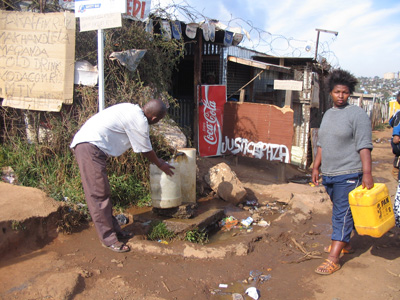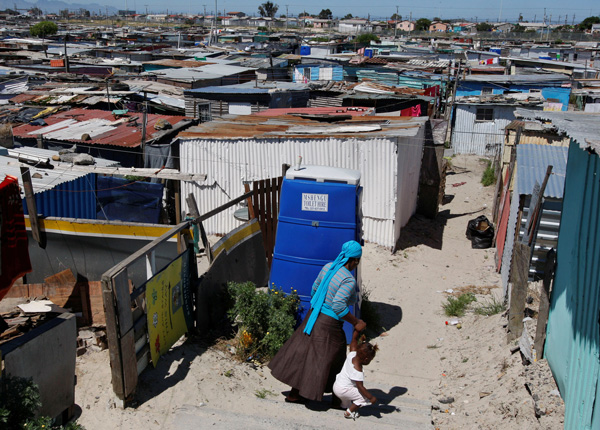South Africa: What Changed... and What Did NOT Change
December 16, 2013 | Revolution Newspaper | revcom.us
Why, with all the sacrifice and courage involved in the struggle against apartheid, has there been so little change in the basic terrible conditions for the great majority of black people in South Africa? The reason is not that things can’t fundamentally change. The reason is not that humanity is stuck with this world of exploitation, oppression and environmental disaster. But there are urgent and critical lessons that must be drawn from that experience in these times when millions of people are up against the question: can things really change?
Apartheid was a system instituted by the descendants of white European invaders to keep the land and resources in the hands of a few rich owners and the country under control of U.S. imperialism. Millions of black Africans suffered a grinding, horrific, hideously unequal existence, full of deprivation and misery.

Communal tap for drinking water in Soweto, 2005. Photo: flickr/SuSanA Secretariat
Between 1990 and 1994, open apartheid was eliminated. But today the land and the valuable resources in and under the land have remained in the hands of rich white owners and imperialists who together still hold the real power in South Africa, even though members of the African National Congress (ANC) may be elected to the presidency and even though there is a now a black elite that shares in this plunder. The conditions of the masses of people, of African people in that country, farmers deprived of land or forced to remain on dirt poor land, miners and millions living in urban slums and shantytowns without any jobs at all—their conditions have remained the same or have even gotten worse. Violence against women and against immigrants runs rampant. Ten years ago, the Indian author Arundhati Roy said that the new regime had “increased ... the hideous disparities between the rich and the poor. More than a million people have lost their jobs.... Ten million South Africans, almost a quarter of the population, have been disconnected from water and electricity. Two million have been evicted from their homes. Meanwhile, a small white minority that has been historically privileged by centuries of brutal exploitation is more secure than ever before.... It’s apartheid with a clean conscience. And it goes by the name of democracy.”
The same essential facts hold today, as shown, for example, in the article “How Mandela Shifted Views on Freedom of Markets,” by Andrew Ross Sorkin, in the New York Times Business Section of December 9, 2013. Sorkin details how Mandela had first promised, on leaving prison, that “the nationalization of the mines, banks, and monopoly industries is the policy of the A.N.C., and a change or modification of our views in this regard is inconceivable.” But then Mandela was “persuaded” at an annual conference in Davos, Switzerland, where major politicians and financial capitalists gather each year, to change his views.
According to the Sorkin article, it was the leaders of China and Vietnam who convinced him. If so, that is only fitting—as these leaders, like the Communist Party of South Africa with whom Mandela was at least aligned, were and are revisionist: that is, political forces which claim the title of “communist” and “revolutionary” but who in fact use that as credibility and legitimacy to accommodate with and carry out capitalism. In any event, Mandela led the ANC to dispense with its promises of nationalization, such as they were, and even further opened South Africa to imperialism.
Since then the gap between white and black South Africans has actually grown. The number of people living beneath the poverty line of $2 a day has hovered near or over 50 percent for the past 20 years. Official unemployment is 25 percent, and for young black African men the official figure is close to 50 percent (and it is very likely that these are underestimates). The wage gap is just as high as ever—$1,900 a month for whites, $250 a month for blacks. And this reckoning of the gap does not even count the class of capitalists, landowners, and financiers who suck up vast amounts of money through investment.
Bob Avakian has said this: “...Revolution means nothing less than the defeat and dismantling of the existing, oppressive state, serving the capitalist-imperialist system—and in particular its institutions of organized violence and repression, including its armed forces, police, courts, prisons, bureaucracies and administrative power—and the replacement of those reactionary institutions, those concentrations of reactionary coercion and violence, with revolutionary organs of political power, and other revolutionary institutions and governmental structures,...”—in a way that involves millions of people who are “conscious of the need for revolutionary change and determined to fight for it.” [from BAsics 3:3] While there were millions who were revolutionary-minded in South Africa in the 1980s, the leadership was in fact not really revolutionary. So revolution—real revolution—did not happen in South Africa, nor was it actually even attempted.
And until there is real revolution, underneath all the gauzy inspirational stories, and behind the black faces in high places, duly voted for in the ritualized elections that stamp oppression as legitimate in today’s world, you will, again, have nothing but “apartheid with a clean conscience that goes by the name of democracy.”
South Africa
Then

A black shantytown under the apartheid regime. Huge numbers were crammed into vast over- crowded settlements well away from the heart of the cities. Geographical isolation was enforced so the oppressed masses could be politically and militarily controlled by the apartheid regime. Housing was a mix of barracks-style blocks built by the government, and shacks pieced together from tin, wood, cardboard and other materials. Substandard schools, unpaved streets, no sidewalks, no electricity, no plumbing were the norm. And the shantytowns were a scene of constant police harassment and brutality, as well as a growing radical and revolutionary ferment among the people. Photo: AP
Now

Soweto shantytown, 2009—15 years after the fall of apartheid, 70 to 80 percent of farmland was still in the hands of the white elite, and survival in the rural areas was ever harder. 61 percent of the population was now urban, and 33 percent lived in "informal settlements" without electricity, sanitation services, sewers and water. Today's overall squatter population is estimated at around 10 million. The African National Congress government says it has built 2.8 million new housing units, but it is basically continuing the housing program of apartheid, keeping the masses of oppressed black people in overcrowded, heavily policed settlements, a safe distance from the gleaming city centers that it showcases to the world. The new housing—called "kennels," or "tin can towns," by the people—are at best concrete versions of the apartheid shantytowns. Up to seven people live in a 180-square-foot concrete box with a corrugated tin roof; seven families may share access to a single bathroom, and transportation to jobs and shops is non-existent. Photo: AP
If you like this article, subscribe, donate to and sustain Revolution newspaper.
